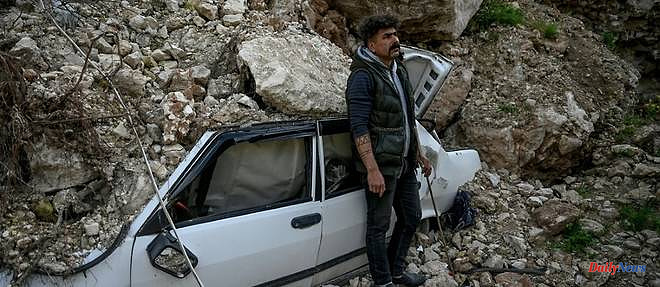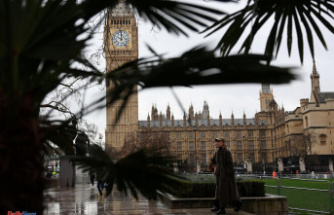Some barely sleep or dread interiors. Others have developed an intense fear of the mountains which previously brought them well-being and comfort.
In southern Turkey, clinging to the foot of the cliffs overlooking Antakya, survivors of the earthquake that killed at least 50,000 people in February are suffering, two months later, from persistent anxiety and unease.
This feeling of anguish has not left them since they lost everything - their home, their loved ones and often their job - on the night of February 6th.
Cuma Zobi knows that feeling well: the 38-year-old security guard was woken up by huge boulders rolling down his house.
The small brick building now offers a large hole as a door.
His car was buried under the rock and his three children, bleeding, had to crawl out of their room when the quake, which occurred shortly before dawn, devastated entire swaths of southeastern Turkey.
Even more massive rocks broke off under the effect of the rains and the aftershocks that followed the first.
"No one dares to enter a house anymore," explains Cuma Zobi in front of his gutted house. "But even if you sleep in a tent, you think about it, you think about it, you dream about it. It will be difficult to get rid of this fear."
The psychiatrist Eralp Turk tries to heal the traumas by traveling through the disaster area on a voluntary basis, armed with a notepad on which he lays down the anxieties of his patients and a chest of medicines.
Eralp Turk is one of his thousands of volunteers who rushed to Antakya? formerly Antioch? after it was wiped out like no other city by the worst disaster in modern Turkey.
The 30-year-old visits around 15 people a day from a list provided by the province's social services.
Some disaster victims hunt him, too withdrawn into themselves to give themselves up to a stranger.
"I do not insist. I only suggest", he explains at the wheel of his sedan.
"The most common symptoms are acute stress, grief, and reactivation of old psychiatric disorders," he says. "But every disaster is different. Each region and its people have their specificities. Culture and traditions also play a role."
The mountain that Nuriye Dagli cherished so much has become a source of stress since "boulders bigger than a tent" nearly took his life on the night of the earthquake.
"We were a happy family," says the 67-year-old, in one of the tents where most of the locals now live.
"We sat at the foot of the mountain, the children played there, there was the smell of flowers, trees," she sighs. "Even when I was alone, I was not afraid."
That time is over.
"A psychiatrist came once. I think it helped," she says, without conviction.
Aysen Yilmaz, a social worker, also surveys the tent villages of the region. His observation is bitter: all the people who consult him present the symptoms of a state of post-traumatic stress.
"Some say they have sleep or appetite problems, others have become very angry or aggressive," reports the 50-year-old. "All of these symptoms are those of post-traumatic stress disorder."
Sevgi Dagli channels all her energy into caring for her baby, born 15 days before the disaster.
The young mother, aged 22, says she cannot confide her emotions. "I keep everything to myself," she says, looking at her infant.
She says she's thinking about leaving the area, because "the more the rubble is cleared, the dustier the air becomes".
"I imagine it's not good for our health," she slips after pausing. "I don't think we really know what we're doing anymore."
07/04/2023 19:18:43 -- Antakya (Turquie) (AFP) © 2023 AFP












